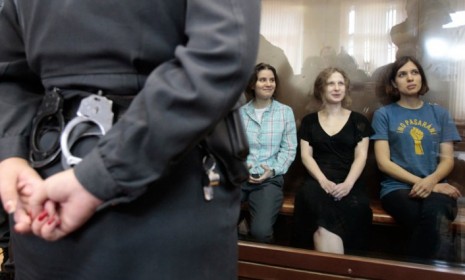All-girl punk band sentenced to two years in Russian jail: Too harsh?
The verdict is in: Pussy Riot will face 19 more months in prison on charges of "hooliganism" for storming a church in Moscow and protesting Putin's rule

A free daily email with the biggest news stories of the day – and the best features from TheWeek.com
You are now subscribed
Your newsletter sign-up was successful
Early Friday, three members of the all-female Russian punk band Pussy Riot were sentenced to two years in jail on charges of "hooliganism motivated by religious hatred" (the closest American equivalent is a "hate crime"). Nadezhda Tolokonnikova, 22, Marina Alyokhina, 24, and Yekaterina Samutsevich, 30, were arrested for storming Moscow's largest Orthodox cathedral back in February. In what the band termed a "punk prayer," the three donned ski-masks and bright-colored spandex while performing a noisy protest against President Vladimir Putin's close ties to the church. Free speech advocates from around the world, including high-profile musicians from Paul McCartney to Björk, have all called for the threesome's immediate release. The band's supporters say the case demonstrates Putin's "refusal to tolerate dissent in his new six-year term as president," says Reuters, and the United States and the European Union have denounced the sentencing as disproportionate. Is the two-year sentence too harsh?
It's actually not surprising: The sentence handed down on Pussy Riot is "par for the course in modern Russia," says Zach Beauchamp at ThinkProgress. The potential maximum sentence for the charge of "hooliganism" is actually seven years. Although this particular case has triggered an international outcry, "it's worth remembering this isn't an isolated incident," and the regime routinely jails dissident journalists, activists, and others who seek to "undermine Russian democracy." Even the members of Pussy Riot saw this one coming.
"Pussy Riot's conviction highlights Russian human rights abuses"
The Week
Escape your echo chamber. Get the facts behind the news, plus analysis from multiple perspectives.

Sign up for The Week's Free Newsletters
From our morning news briefing to a weekly Good News Newsletter, get the best of The Week delivered directly to your inbox.
From our morning news briefing to a weekly Good News Newsletter, get the best of The Week delivered directly to your inbox.
And Putin might not have had a choice: "Putin faces the dilemma of the tyrant throughout the ages, a dilemma now playing out in especially dark and bloody form in Syria," says Rupert Cornwell at the Independent. The stakes aren't quite as high as Assad's, but the principle remains the same: "Any relaxation risks being taken as a sign of weakness," which would likely only "embolden opponents." Pussy Riot have already achieved martyr status, so any punishment would inevitably be interpreted as too heavy-handed. "Truly, it's tough being the tough guy."
"Rupert Cornwell: Putin faces the age-old dilemma of the tyrant"
The sentence will only incite more outrage: Pussy Riot had two points to make, says an editorial in the Guardian: "That the Orthodox Church provides intellectual and religious cover for Mr. Putin's increasingly messianic political brand; and this man is driving Russia straight up a cul de sac." The verdict handed down today only highlights Putin's inability to reestablish himself as a leader for Russia, especially with "no policies to offer a generation that has been politically awakened." The Russian government wished to "crush political dissent," but the shouts calling for Putin's resignation will only get louder. "The Pussy Riot trial will not be the last."
A free daily email with the biggest news stories of the day – and the best features from TheWeek.com
-
 How to Get to Heaven from Belfast: a ‘highly entertaining ride’
How to Get to Heaven from Belfast: a ‘highly entertaining ride’The Week Recommends Mystery-comedy from the creator of Derry Girls should be ‘your new binge-watch’
-
 The 8 best TV shows of the 1960s
The 8 best TV shows of the 1960sThe standout shows of this decade take viewers from outer space to the Wild West
-
 Microdramas are booming
Microdramas are boomingUnder the radar Scroll to watch a whole movie